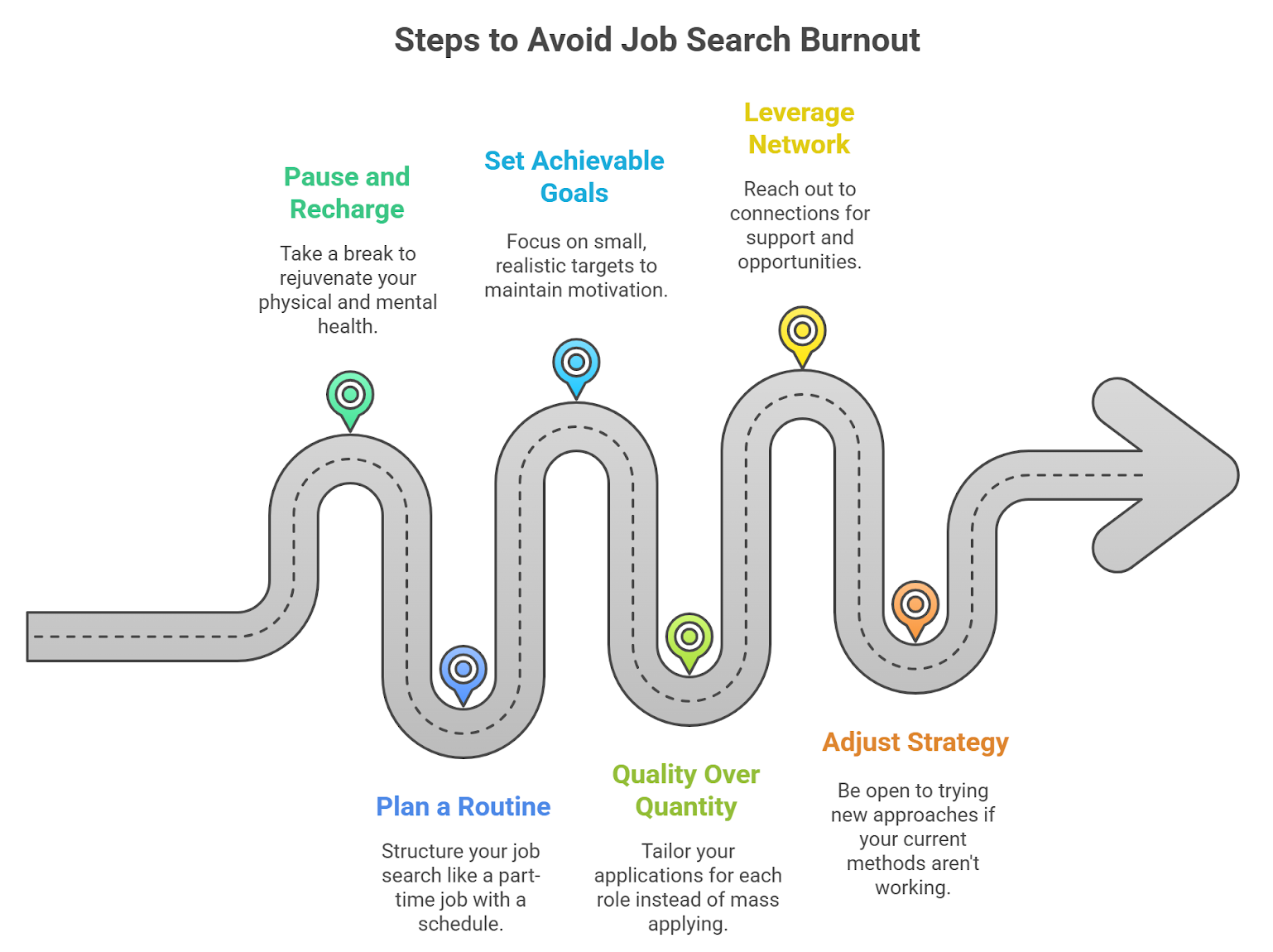

How to Deal with Burnout and Hopelessness from Job Searching
Burnout doesn’t mean you’re failing — it means you’re overloaded. With strategy and support, clarity returns and momentum becomes possible again.

Burnout doesn’t mean you’re failing — it means you’re overloaded. With strategy and support, clarity returns and momentum becomes possible again.
Job searching in the modern economy can be very challenging, to say the least. With recruiters relying heavily on AI-powered Applicant Tracking Systems (ATS), it can feel like you’re filling dead-end applications, leading to what is known as a job search burnout.
And if you’re also feeling hopeless during a job search, you’re not alone. In fact, nearly 66% of job seekers have reported experiencing burnout during their job hunt.
However, it is crucial that you stay on track and don’t lose sight of your goal. But how to do it? By overcoming job search burnout, dealing with job search frustration, and managing feelings of hopelessness. In this guide, we’ll understand what it is, what causes it, and how to avoid it.
It can be described as a state of physical or emotional exhaustion specifically caused by the stress of looking for employment, and if it is not addressed, it can also lead to feelings of hopelessness and depression.
But this also begs the question, “Why is the process of job search so exhausting?”
Well, as of today, looking for employment is more than just filling out applications and hoping for a callback. The following are the reasons why it causes emotional and physical exhaustion:
Before we jump into solutions of how to deal with job hunt exhaustion, it is also essential to know its signs.
If you’re experiencing any of these symptoms, don’t dismiss them as a phase, because these are warning signs of search anxiety.

First, take a deep breath. Coping with job search anxiety is crucial because your health is more important. Now, let’s see how you can successfully handle job search exhaustion.
While it may feel counterintuitive, taking a break can be the best thing you can do for yourself. A lot of people may dismiss your struggles by saying something like, “If you’re not employed, looking for a job should be your full-time job”.
This is great on paper, but we cannot pretend that people with full-time jobs don’t experience burnout.
So, to recharge your physical and mental self, engage in relaxing activities or exercise. This is not wasting time, because when you return, you’ll have more energy and a new perspective.
Much like how retired people fall into a spiral of negative thoughts due to a lack of routine, the same is true for you. If you don’t have a structured job application approach, it can get very ugly, very quickly.
So, to avoid that, treat your job search like a part-time position with a proper schedule. For example, you might dedicate a time period, say from morning to noon, for job search activities each weekday. During those hours, you focus on applications, networking emails, etc., and after that, you allow yourself guilt-free downtime.
Pro Tip: Introduce time blocking in your routine with proven approaches like the Pomodoro technique.
Let’s be honest now, if you just graduated from college, you are not going to land a six-figure role, and even that on your first application.
Therefore, it is best to set small, achievable goals that you can accomplish in a day or even a week. For instance, instead of forcing yourself to apply to every single job posting ASAP, focus on applying for just one position and reaching out to just one new networking contact.
Pro Tip: If you’ve just graduated and are unsure how to go about looking for a job, it is highly recommended that you invest in career coaching for college graduates.
Chances are you’ve also fallen into the trap of applying to as many postings as possible in hopes of getting an interview. Here’s the reality: a strategic approach is and always will be more effective than hitting the “Easy Apply” button on every single job opening.
Within your routine (as mentioned in #2 point), focus on tailoring your resume and cover letter for each role.
One of the most important things you need to understand is that you don’t need to go alone on a job hunt. Reach out to your family, friends, teachers, or professional connections (LinkedIn).
You’ll be more than surprised to know how many opportunities they can link you with, and if not, they can provide emotional support, as there are high chances they might’ve gone through the same struggles.
One thing to keep in mind when reaching out to networking contacts is to focus on building a relationship first, by asking about their path and showing genuine interest in what and how they’re working.
NOTE: Don’t hesitate to lean on a private career counselor as well. For instance, career transition coaching services and interview preparation coaching services offered by FutureStreet Careers can be tremendously beneficial in helping you find a job without experiencing burnout.
Remember, “Insanity is doing the same thing repeatedly and expecting different results.” – Rita Mae Brown.
If you’ve been job searching for a while with little to show for it, don’t be afraid to try something new, whether it’s reaching out directly to a hiring manager, attending a virtual career fair, or exploring a different role than you originally aimed for. Staying informed about trends in your industry and being open to changing tactics can be particularly beneficial.
Pro Tip: Focus on the three R’s of job search, i.e., Research, Relevance, and Relationships.

Despite having the best approach to job hunting, you can still experience a lack of motivation. Here’s how you can deal with that:

Job searching can truly feel like an uphill battle, especially when burnout and hopelessness set in. But as we’ve explored, there are concrete ways to overcome those feelings and regain control. It’s also vital to address the emotional side: rejection is tough, but try not to take it personally, and lean on others when you need support.
If you’re struggling, professional help from career coaches at FutureStreet Careers is available right now.
It is when you become physically and mentally exhausted from constantly applying for jobs and getting rejected.
Yes, with the right approach, i.e., focusing on quality, taking a break, and making meaningful connections.
These are some of the signs.
Absolutely! In fact, professionals like FutureStreet Careers can be the difference between you experiencing job burnout and landing your dream job.
Stress is a temporary reaction to a challenge, like a deadline or a difficult interview. Burnout, on the other hand, is a state of chronic, prolonged stress that leads to physical and emotional exhaustion, a cynical outlook, and a lack of accomplishment.
Yes. Burnout can also happen to employed individuals who are actively searching for a new job due to the stress of balancing their current work responsibilities with the demands of a job search, including writing new resumes, preparing for interviews, and networking.
It depends on your personal needs and how you feel. It could be a day, a weekend, or even a full week. The key is to make it a break focused on recharging.


